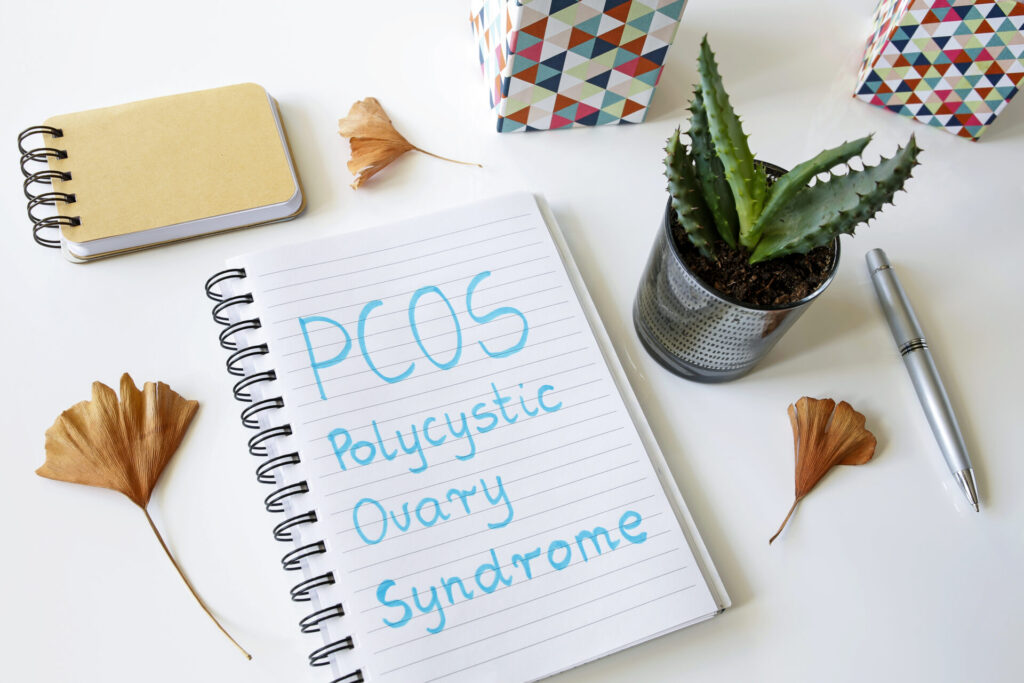
What can I do about PCOS? Polycystic ovary syndrome (PCOS) symptoms often go unnoticed or can be put down to other causes, which means it often goes undiagnosed for a long time. It is common among young, menstruating women, and indicates a hormonal imbalance. PCOS symptoms usually develop shortly after puberty, but can also develop later into early adulthood.
How is PCOS diagnosed?
Usually, PCOS is diagnosed by your GP when you experience two of the following three signs:
- Polycystic ovaries. It is quite common for women develop cysts on their ovaries. However, your ovaries might contain multiple follicles covering the eggs and be swollen. This can cause the ovaries to not function properly according to a normal cycle.
- Irregular periods. Women with PCOS often have irregular or missed periods as a result of not ovulating. The eggs get trapped in the follicles. So missing periods regularly are a common sign of PCOS. For example, you might have more than 35 days between periods. Some women suffer from abnormally heavy periods. Infertility is a common problem in these cases.
- Excess androgen. You can be tested for elevated levels of male hormones or androgens. High testosterone may result in physical signs, such as severe acne, excess facial and body hair (hirsutism) and hair loss (baldness).
Symptoms include:
- Irregular periods or no periods at all
- Difficulty getting pregnant
- Excessive hair growth
- Weight gain
- Thinning hair or hair loss
- Oily skin or acne
The exact cause of PCOS is unknown. Although, aiming to balance your hormones and manage weight loss may reduce the risk of long-term complications. PCOS is also associated with an increased risk of developing health problems in later life, such as type 2 diabetes, heart disease and infertility. If you are struggling to conceive, you should get help with hormone balance as soon as possible. This is where a nutritional therapist can guide and educate you.
What can I do about PCOS?
Your GP might prescribe the contraceptive pill and metformin (to balance insulin levels) which can help to balance your hormones, but I prefer to advise my clients on a more natural approach.
It is common for women with PCOS to struggle with weight management, and obesity can be an issue. You do need to lose weight, although I believe that you need to get healthy to lose weight, not lose weight to get healthy. A healthy, wholesome diet and a health mindset go a long way in improving your symptoms and balancing your hormones. This includes a good diet, regular exercise, good sleep and stress management.
By tackling the root cause of hormonal imbalance, the Functional Medicine approach to PCOS works to restore regular periods and ovulation. This, combined with other natural methods can reduce your symptoms and help you to conceive naturally.
Managing PCOS requires a multi-targeted approach:
- Minimising Stress with lifestyle improvements
- Blood Sugar Balancing to improve insulin sensitivity
- Supporting Gut Health to reduce inflammation and improve absorption
- Toxic load reduction to support the liver
- Optimising Diet and using supplements and herbs to support hormone balance
The goal is to get your hormones back into balance to facilitate a normal menstrual cycle and re-establish ovulation.
To balance hormones, you do need to balance blood sugar, ideally through diet. This includes increasing protein and good fats (to manage hunger), and to reduce carbohydrates (to manage insulin spikes).
It is important to look holistically at what’s happening in your body, so I work with a detailed health assessment and ideally, targeted functional tests to look at hormone and gut imbalances, as well as regulating sugar intake and calming inflammation. There are some key nutrients which are required to balance hormones, so depending on your root cause issues, this can be addressed through food, lifestyle and supplement recommendations.
If you are struggling with any of the above symptoms, and would like to know more about how to balance your hormones and restore ovulation, then I would be happy to discuss your options, so please click the link to book a free Discovery Call.


0 Comments